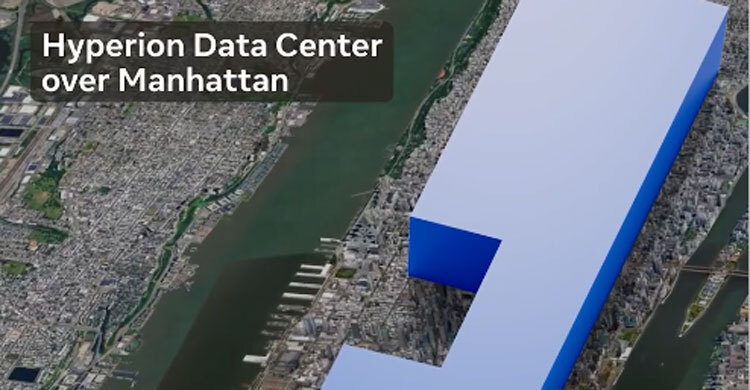Zuckerberg unveils AI supercluster push, targets superintelligence by 2026

Meta CEO Mark Zuckerberg announced an ambitious plan to position the company as a leader in artificial intelligence by investing “hundreds of billions of dollars” into developing superintelligence – AI systems surpassing human capabilities.
In a post on Facebook, Zuckerberg outlined Meta’s strategy to build the industry’s most elite, talent-dense AI team and deploy unprecedented computational infrastructure, including the Prometheus and Hyperion superclusters, set to come online starting in 2026.
Zuckerberg’s announcement follows the creation of Meta Superintelligence Labs (MSL), a division launched to unify Meta’s AI efforts under the leadership of Alexandr Wang, former CEO of Scale AI, and Nat Friedman, former GitHub CEO.
The initiative, backed by a $14.3 billion investment in Scale AI, aims to overcome setbacks with Meta’s Llama 4 model and compete with rivals like OpenAI, Google, and Anthropic.
“Developing superintelligence is coming into sight,” Zuckerberg stated, emphasizing Meta’s commitment to leading the charge in this transformative technology. He highlighted the company’s financial strength, noting that Meta’s $100 billion annual cash flow from its ad business enables massive investments without reliance on external capital.
Meta is set to redefine AI infrastructure with its supercluster projects. According to a SemiAnalysis report, Meta is on track to be the first to bring a 1-gigawatt (GW) supercluster, named Prometheus, online in 2026. This cluster alone will cover a footprint comparable to a significant portion of Manhattan.
Meta is also developing Hyperion, a scalable supercluster designed to reach up to 5 GW over several years, alongside multiple “titan” clusters to bolster its compute capacity.
“Meta Superintelligence Labs will have industry-leading levels of compute and by far the greatest compute per researcher,” Zuckerberg said, underscoring the strategic advantage of providing researchers with unparalleled resources.
These clusters, costing an estimated $30 billion per GW, will support Meta’s goal of advancing AI model development and delivering “personal superintelligence for everyone.”
Zuckerberg’s vision hinges on assembling a compact, high-calibre team of researchers, many poached from competitors. Meta has recruited talent from OpenAI, Google DeepMind, and Anthropic, including Jack Rae (Gemini pre-training lead), Hongyu Ren (co-creator of GPT-4o and o-series models), Pei Sun (Gemini reasoning expert), Jiahui Yu (GPT-4o co-creator), and Shengjia Zhao (ChatGPT co-creator). The team also includes Daniel Gross, co-founder of Safe Superintelligence, and Johan Schalkwyk, a former Google Fellow.
Reports indicate Meta offered compensation packages ranging from $100 million to $300 million over four years, with signing bonuses as high as $100 million, sparking controversy in the AI talent war. OpenAI CEO Sam Altman claimed Meta’s aggressive poaching included offers to his staff, though Meta denied the highest figures.
Zuckerberg’s push echoes his earlier metaverse ambitions, which saw Meta rebrand from Facebook but struggled with lacklustre adoption of projects like Horizon Worlds. Critics, citing Meta’s $50 million creator fund failure, question whether the superintelligence initiative will deliver on its lofty promises. “Superintelligence is a vague, futuristic goal,” said Subbarao Kambhampati, an AI researcher at Arizona State University, noting that even artificial general intelligence (AGI) remains elusive.
Despite scepticism, Meta’s financial muscle and user base of over 2 billion daily active users provide a unique platform for deploying AI at scale, particularly in products like Meta AI and AI-powered glasses. The acquisition of Scale AI’s expertise in data labelling, including its HLE (Humanity’s Last Exam) benchmark, addresses past data quality issues with Llama 4.
Meta’s restructuring comes as competitors like OpenAI, backed by Microsoft’s $13 billion, and Anthropic, with Amazon’s $8 billion, intensify the race for AGI and beyond. Zuckerberg’s personal involvement, including direct recruitment at his Lake Tahoe and Palo Alto homes, reflects his urgency to keep Meta competitive. Failed acquisition attempts for startups like Safe Superintelligence and Perplexity highlight the fierce competition for talent and technology.
As Meta pours resources into MSL, the stakes are high. Success could redefine the company as an AI powerhouse, leveraging its compute and talent to deliver ground-breaking models like Llama 4.1 and 4.2, which already power Meta AI for over 1 billion monthly users. Failure, however, risks repeating the metaverse’s costly missteps, with shareholders watching closely.
With Prometheus set for 2026 and Hyperion scaling thereafter, Meta is betting big on compute and talent to achieve superintelligence. Whether this vision transforms humanity, as Zuckerberg claims, or becomes another over-hyped venture remains to be seen. For now, Meta Superintelligence Labs is poised to reshape the AI landscape, one supercluster at a time.

